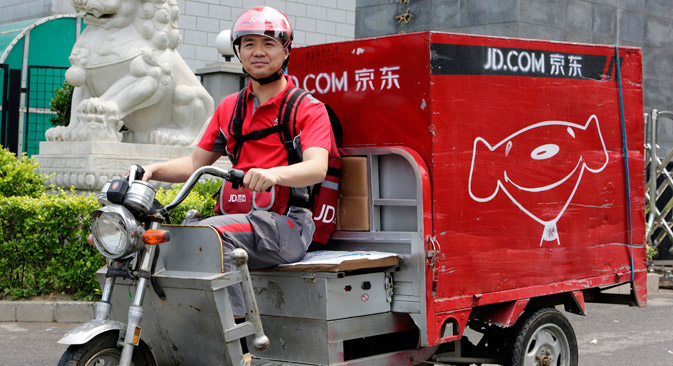China wins online sales in Russia

Richard Liu, CEO and founder of China's e-commerce company JD.com, rides an electric tricycle as he leaves a delivery station to deliver goods for customers to celebrate the anniversary of the founding of the company, in Beijing. Source: Reuters
Chinese online vendors have won the lion’s share of Russia’s cross-border e-commerce business over competitors from Europe and the U.S., spurred on by the ruble’s continued decline and a recession that has prompted Russians to shop for less expensive items.
Chinese firms took 65 percent of Russian online orders from abroad in 2014, according to a report by the East-West Digital News.
“In 2014, Russians placed about 50 million orders from Chinese online stores, up 40 percent from the previous year,” said Evgeniya Arnautova, press officer for the Russian payment platform Yandex.Money.
Chinese vendors’ success in Russia comes amid double-digit growth of e-commerce sales in Russia. The cross-border segment of the Russian e-commerce sector expanded by 70 percent last year to reach total sales of $5 billion.
According to Arnautova, users paid almost eight times more for orders from China during the summer of 2015 than a year ago, using Yandex.Money as well as Yandex.Kassa, a full-fledged payment solution that includes not only electronic wallets but also bank cards, Internet banking, mobile phone account payments, and payments through terminals.
Russians’ interest in Chinese online shopping has increased with the entry of new players into the Russian market.
Over the last year, Yandex.Money connected nearly 40 new large and medium Chinese online shops to the payment system.
“The second reason for the popularity of Chinese platforms is a wide range of products and low prices, competitive even with an unstable exchange rate,” Arnautova said.
Adrien Henni, lead author of the EWDN research study on cross-border sales to Russia, noted that a range of Chinese players, who now sell via such platforms as AliExpress, eBay or Amazon, are interested in the Russian market and will attempt to sell directly to Russian consumers as soon as they have decided they understand the market and set up the necessary procedures.
A subsidiary of Alibaba Group, the online retailer AliExpress, which started operations in Russia in 2012, has become the most popular online retailer in Russia.
In 2015, the Chinese platform has become the leader of the Russian e-commerce market in terms of the total number of customers. According to TNS, the monthly customer base of the online retailer in Russia amounted to almost 19.6 million people in April 2015, showing a 50 percent increase compared to April 2014.
Russia ranks second in AliExpress’s global audience, providing almost 10 percent of the retailer’s traffic, according to the website Similar Web, and is second only to the U.S., with 11 percent of traffic.
Gross merchandise sold through Alibaba’s marketplaces in Russia in 2014 totaled 110 billion rubles ($1.69 billion).
Meanwhile, the dynamics of the U.S. online businesses, which appeared in Russia in 2010, are stagnating. eBay and Amazon earned no additional market share in Russia in 2015, and their customer bases amount to 4 million people and 1.5 million people respectively.
At the same time, according to East-West Digital News analysts, forecasts for the Russian online retailing market remain very favorable, even taking into account the changed geopolitical realities and the effect of the falling ruble.
In June 2015, the Russian market was entered by the second largest Chinese giant JD.com, with 11 percent of shares owned by Russian oligarchs Alisher Usmanov and Yury Milner.
The retailer aims to take 20 percent of Russia’s e-commerce market in the next five years, selling Asian electronics and appliances at discounted prices.
“JD.COM, which localized its site in Russian just two months ago, can be regarded as a serious competitor with its alliances with such powerful players as the Russian Post and SPSR (for logistics) and Ulmart.ru (for distribution),” says Henni. In his opinion, AliExpress leadership in the China-to-Russia e-commerce segment is largely due to its first-mover advantage.
These new entrants could have a big impact on the Russian market, which is far from being mature. “Millions of Russian people will start buying online over the next decade, and they will certainly be interested in their offers,” says Henni.
Selling Russian Goods in China
Both Chinese players, AliExpress and JD.com, also plan to sell Russian goods in China. “In China, some categories of Russian products are now very popular, such as eco-products,” Arnautova says.
Chinese online merchant Alibaba Group reached an agreement with Russian retail chain ABK on the sale of foods, cosmetics and convenience goods in China.
JD.com expects to start selling Russian food, jewelry, furs and other goods in China by the end of 2015, Victor Xu, President of JD.com’s international business group, announced at a press conference in June.
According to Xu, JD.com’s managers also met with officials of the Russian government and discussed the topic of trade between China and Russia.
Chinese authorities plan to expand the presence of Chinese firms in the logistics chain by shipping Chinese goods to Western markets.
“We hope to implement projects such as building an e-commerce logistics center in Yekaterinburg to expand trade between the two regions,” said the mayor of Harbin, Song Xibin, in an interview with RBTH in June.
Proposals for the construction of such centers in Vladivostok and Ulyanovsk have already been made by Chinese officials.
All rights reserved by Rossiyskaya Gazeta.
Subscribe
to our newsletter!
Get the week's best stories straight to your inbox


